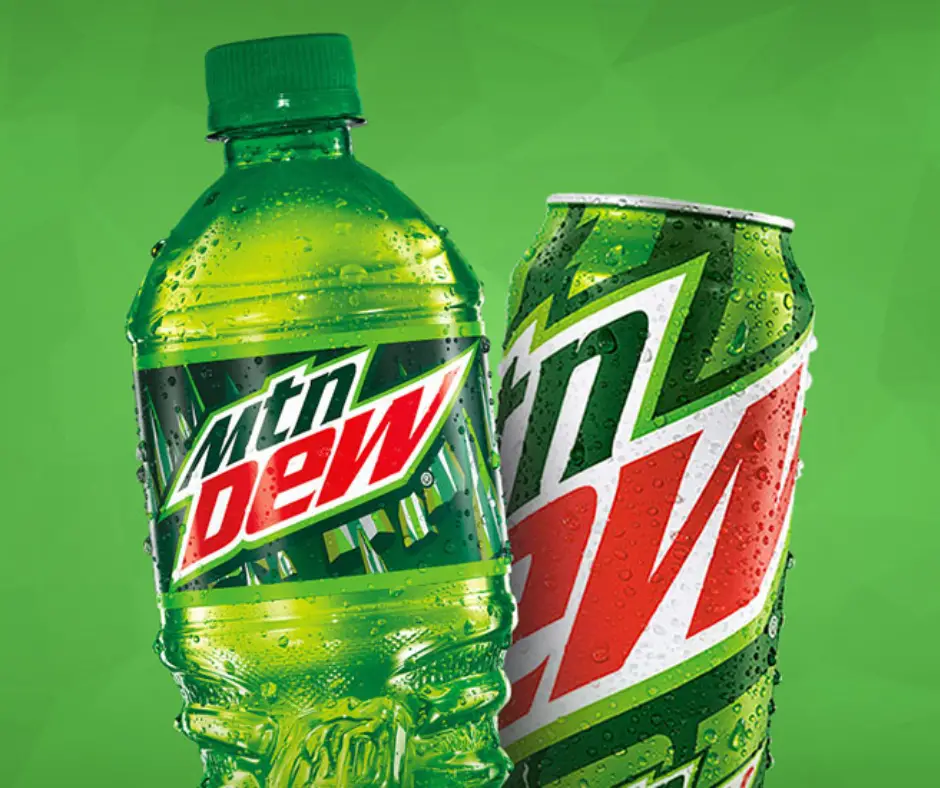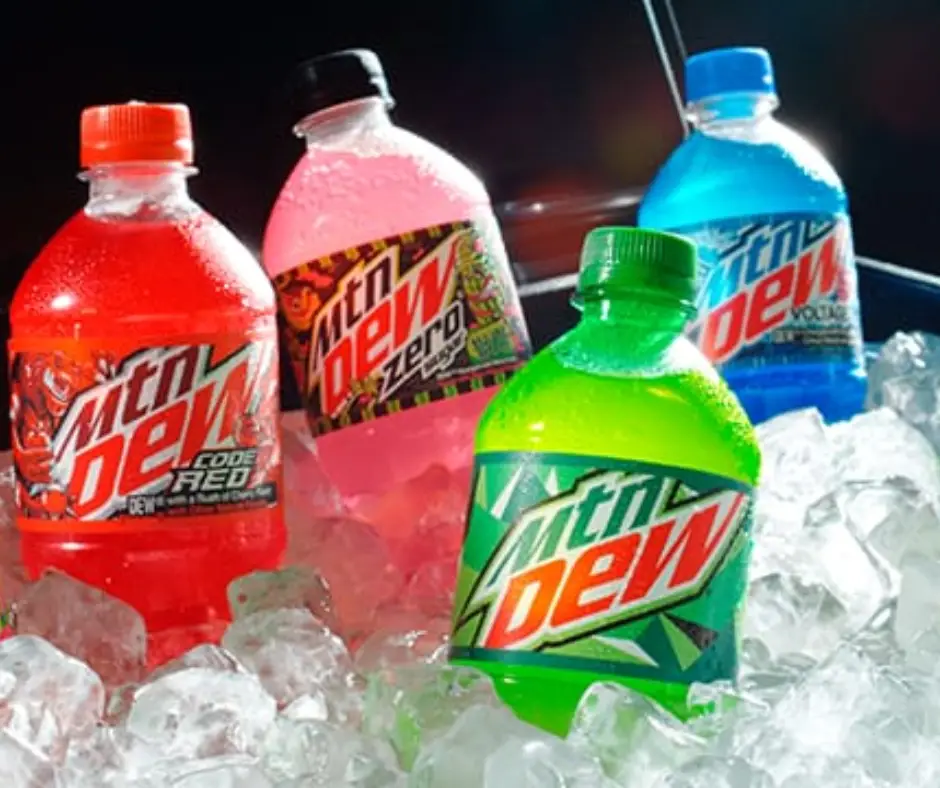Introduction
Mountain Dew is a popular soft drink known for its distinctive taste and energizing properties. However, there has been ongoing discussion regarding the potential health risks associated with its consumption. This article will examine the risks and debunk the misconception of ‘Is Mountain Dew Bad For You?‘.

The Popularity Of Mountain Dew
Mountain Dew has developed a massive fan base, becoming a staple in many households. Its unique flavor and refreshing taste have garnered a loyal following. With various flavors and styles available, Mountain Dew offers versatility to cater to different preferences.
Debunking The Misconception Of Mountain Dew Being A Healthy Choice
Contrary to popular belief, Mountain Dew is unhealthy and has several risks. Here are some factors to consider:
- High Sugar Content: Mountain Dew contains significant sugar, primarily high fructose corn syrup. Excessive consumption of sugary drinks can contribute to weight gain, obesity, and increased risk of dental caries and tooth decay.
- Citric Acid: Mountain Dew also contains citric acid, which can damage tooth enamel and increase the risk of cavities. The combination of high sugar and citric acid wears away the enamel over time, leading to oral health issues.
- Caffeine: Mountain Dew contains caffeine, which can worsen depressive symptoms in some individuals. It is important to monitor caffeine intake, especially in younger individuals, to avoid potential negative effects on mental health.
- Association with Poor Eating Habits: Regular soda consumption, including Mountain Dew, has been associated with poor eating habits, including higher sugar intake, carbohydrates, and junk food. This can result in a lower intake of essential vitamins and nutrients from healthier food sources.
- Sodium Benzoate: Mountain Dew contains sodium benzoate as a preservative, which has raised concerns about its potential effects on brain development and cognitive impairment, particularly in children.
Making informed decisions about including Mountain Dew in your diet is important. While occasional consumption may not have significant health implications, regular and excessive intake can lead to adverse effects. It is always recommended to prioritize water and healthier beverage options over sugary drinks.
It’s essential to be aware of the potential risks of consuming Mountain Dew and make choices that prioritize your health and well-being.
The Effects On Dental Health
Regarding the impact on your dental health, paying attention to the ingredients in your favorite beverages is important. Mountain Dew, in particular, has gained notoriety for its potential risks to oral health. To answer ‘Is Mountain Dew Bad For You?’, let’s examine the reasons behind this concern.
The High Sugar And Citric Acid Content
One of the primary factors is the high sugar content in Mountain Dew. A 12-fluid-ounce serving of this popular soft drink contains approximately 11 teaspoons of sugar. Consuming excessive amounts of sugar can lead to tooth decay, as bacteria in the mouth thrive on sugar and produce acids that erode tooth enamel.
Additionally, Mountain Dew contains citric acid, which adds another layer of danger to the drink. Acidic ingredients, like citric acid, can weaken tooth enamel, making the teeth more susceptible to damage and decay.
The Link Between Mountain Dew And Tooth Decay
Mountain Dew Mouth is a term used to describe the tooth decay that accompanies frequent consumption of Mountain Dew, primarily in the Appalachian region of the United States. This region, in particular, faces unique challenges, such as limited access to quality dental care and high poverty rates.
Studies have shown that consuming carbonated soft drinks, including Mountain Dew, increases tooth decay and erosion risk. The combination of sugars, carbonation, and acids within these beverages weakens tooth enamel, promotes bacterial growth, and contributes to the deterioration of dental health.
To reduce the risk of Mountain Dew Mouth and protect your teeth, decreasing the consumption of Mountain Dew and other soft drinks is recommended. Sipping these beverages throughout the day can continuously expose your teeth to damaging acids and sugars. Drinking water afterward and using it as a mouthwash can help reduce acidity. Regular dental visits are crucial to identify and address any signs of decay before they progress.
However, it’s important to note that various factors influence dental health. While reducing soda intake is beneficial, it may not be solely responsible for dental issues in the Appalachian region. Socioeconomic factors, limited access to dental care, and poor water quality also contribute to the dental health disparities observed in this area.
In conclusion, while Mountain Dew and other soft drinks can damage dental health due to their high sugar and acid content, it is essential to consider other factors contributing to dental health disparities. Maintaining a balanced diet, practicing good oral hygiene, and seeking regular dental care are essential for optimal dental health.
Hormonal And Reproductive Effects

Many people enjoy the refreshing taste of Mountain Dew, but there has been speculation about ‘Is Mountain Dew Bad For You?’, particularly about hormones and fertility. This section will examine the risks associated with consuming Mountain Dew and its potential impact on hormonal balance and reproductive function.
The Role Of BPA In Mountain Dew Cans
One of the main concerns regarding Mountain Dew is the presence of bisphenol A (BPA) in the lining of its cans. BPA is an industrial chemical used in various plastic containers and can also be found in the lining of food cans. While the Food and Drug Administration (FDA) considers BPA to pose minimal health risks, there is growing evidence suggesting potential adverse effects of prenatal BPA exposure on ovarian development and the risk of infertility and ovulation disorders.
A study conducted by the Boston University School of Public Health researchers found that prenatal BPA exposure can affect ovarian development, which could have long-term consequences for reproductive health. Although more research is needed to establish causative associations between BPA exposure and human ovulation disorders, the study highlights the potential risks of prenatal exposure to BPA.
The Potential Impact On Hormone Levels And Fertility
Mountain Dew’s hormonal and reproductive effects can also be attributed to other factors, such as the soda’s high sugar content and artificial additives. Excessive consumption of sugar-sweetened beverages has been associated with an increased risk of infertility and ovulatory disorders. Additionally, the artificial dyes used in Mountain Dew, such as Yellow 5, have been linked to drops in zinc levels in the body, which is an essential nutrient for reproductive health.
It is important to note that while there are concerns surrounding the potential impact of Mountain Dew on hormone levels and fertility, more research is needed to establish definitive conclusions. However, it is generally advisable to limit the consumption of sugar-sweetened beverages and prioritize a balanced diet rich in nutrients for optimal reproductive health.
In conclusion, the potential risks of Mountain Dew regarding hormonal balance and reproductive function should be considered. The presence of BPA in the lining of Mountain Dew cans and the high sugar content of the beverage may have implications for fertility and overall health. It is always recommended to consult healthcare professionals for personalized advice and to make informed dietary choices.
Weight Gain And Blood Sugar Issues
Mountain Dew is a popular carbonated soft drink known for its bold and refreshing taste. However, it’s important to be aware of the potential risks associated with consuming this beverage. This section will examine the connection between Mountain Dew and weight gain and the risk of developing blood sugar problems and diabetes.
The Connection Between High Sugar Intake And Weight Gain
One of the main concerns with Mountain Dew is its high sugar content. A 20-ounce bottle of Mountain Dew contains approximately 77 grams of sugar, more than double the recommended daily limit for added sugars. Consuming excessive amounts of sugar can contribute to weight gain and increase the risk of obesity.
When you consume sugary beverages like Mountain Dew, your body quickly absorbs the sugar, causing a rapid spike in blood sugar levels. This can lead to increased insulin production, which promotes fat storage and can contribute to weight gain over time. Additionally, the empty calories from sugary drinks can add up quickly, leading to an imbalance between calorie intake and expenditure, contributing to weight gain.
The Risk Of Developing Blood Sugar Problems And Diabetes
In addition to weight gain, regularly consuming high amounts of sugar, such as those found in Mountain Dew, can hurt blood sugar control and increase the risk of developing blood sugar problems and diabetes.
When you consume sugary drinks, your body must work to maintain stable blood sugar levels. Over time, consistently high sugar intake can strain your body’s ability to regulate blood sugar effectively. This can lead to insulin resistance, a condition in which the body’s cells become less responsive to the hormone insulin, resulting in higher blood sugar levels.
Insulin resistance is a key factor in developing type 2 diabetes, a chronic condition characterized by high blood sugar levels. Consuming sugary beverages like Mountain Dew can contribute to developing insulin resistance and increase the risk of developing type 2 diabetes.
It’s important to note that the risks associated with Mountain Dew and other sugary beverages are not limited to weight gain and blood sugar issues. Excessive sugar intake can also negatively affect dental health and increase the risk of other chronic diseases like heart disease.
In conclusion, while Mountain Dew may be a tasty and refreshing beverage, it’s important to consume it in moderation and be aware of the potential risks associated with its high sugar content. Opting for healthier alternatives like water, unsweetened tea, or naturally flavored sparkling water can help reduce the risks of weight gain and blood sugar issues. It’s always a good idea to prioritize a balanced and varied diet for overall health and well-being.
Remember, it’s best to consult with a healthcare professional or registered dietitian if you have specific health concerns or questions about your diet.
Cognitive And Memory Effects

Is Mountain Dew bad for you? There have been concerns about the potential risks associated with consuming this popular soda, particularly its impact on cognitive function and memory. Let’s take a closer look at the evidence.
The Study On Bromine-containing Soda And Memory Loss
There have been claims that Mountain Dew contains brominated vegetable oil (BVO), which is associated with memory loss. However, it’s important to note that in 2014, PepsiCo removed BVO from their Mountain Dew formula due to consumer concerns. So, current formulations of Mountain Dew do not contain BVO.
The Potential Impact Of Consuming Mountain Dew On Cognitive Function
While no conclusive evidence directly links Mountain Dew to memory loss, this beverage’s high sugar and caffeine content can negatively affect cognitive function. Excessive consumption of sugary drinks, including Mountain Dew, has been associated with decreased alertness, impaired cognition, and memory loss. The caffeine in Mountain Dew can also lead to insomnia, headaches, and difficulty concentrating.
Here’s a table summarizing some potential risks of consuming Mountain Dew:
| Risks | Mountain Dew |
|---|---|
| Memory loss | No conclusive evidence |
| Decreased alertness | Possible |
| Impaired cognition | Possible |
| Insomnia | Possible |
| Headaches | Possible |
It’s important to remember that moderation is key. Consuming Mountain Dew or any sugary beverage in excessive amounts can harm your health. If you choose to drink Mountain Dew, it’s best to do so in moderation and be aware of the potential risks associated with its consumption.
In conclusion, while there is no definitive answer to whether Mountain Dew is bad for you, excessive consumption of sugary beverages like Mountain Dew can negatively affect cognitive function and overall health. Maintaining a balanced and varied diet for optimal well-being is always advisable.
Skin Lesions And Bromine Intoxication
In recent years, concerns and rumors have been circulating about the presence of brominated vegetable oil (BVO) in popular soft drinks, particularly Mountain Dew. Some claim that BVO can cause various health issues, including skin lesions and ulcers. Let’s take a closer look at the facts surrounding this topic.
The Use Of Brominated Vegetable Oil (BVO) In Mountain Dew
Brominated vegetable oil (BVO) is a food additive used since the 1930s to prevent ingredients from separating in sodas and other beverages. It functions as an emulsifier, especially in citrus-flavored drinks, to prevent the separation of citrus oils.
However, concerns have been raised about the potential health risks of consuming BVO in large amounts. BVO contains bromine, a corrosive chemical that can compete with iodine for receptor sites in the body. This competition may lead to hypothyroidism, autoimmune disease, and even cancer.
Major beverage companies, including Coca-Cola and PepsiCo, have changed their products in response to these concerns. PepsiCo, the maker of Mountain Dew, confirmed that they had removed BVO from their soft drink.
The Potential For Skin Lesions And Ulcers From BVO Overconsumption
A 1971 study on rats suggested that BVO could be toxic when consumed in high amounts. It found that rats fed a diet containing 0.5 percent BVO experienced adverse effects. However, it’s important to note that this study was conducted on animals and may not directly translate to human experiences.
Although limited studies have indicated that large amounts of BVO in soda consumption may lead to bromine-related symptoms such as memory loss and nerve disorders, more research is needed to understand the long-term effects on human health. Experts suggest that drinking soda in moderation, such as a can a day, is unlikely to pose harmful effects.
It’s worth mentioning that BVO has been removed from most soft drinks due to public concerns and pressure. The Food and Drug Administration (FDA) categorizes BVO as allowed in certain amounts on an interim basis, but it has been banned as a food additive in Europe and Japan.
In conclusion, while concerns about BVO and its potential health risks exist, major beverage companies have removed it from their products. Drinking Mountain Dew or other sodas that no longer contain BVO as an ingredient is generally considered safe when consumed in moderation. As with any food or beverage, it’s always wise to maintain a balanced and varied diet.
Thyroid Health And Bromine Interference
The thyroid gland regulates the body’s metabolism and hormone production. However, exposure to certain chemicals, such as bromine, can interfere with thyroid function and lead to health issues. This blog section will explore the relationship between bromine and thyroid health, highlighting the risks associated with bromine intake.
The Competition Between Bromine And Iodine For Thyroid Hormone Production
One of the main concerns with bromine exposure is its ability to compete with iodine, an essential element for thyroid hormone production. Both bromine and iodine belong to the halogen family, and our thyroid gland often absorbs both of these elements. However, when bromine levels are high, it can displace iodine and hinder the production of thyroid hormones. This interference can lead to imbalances in thyroid function, potentially resulting in iodine deficiency.
A study published in the journal Pharmacology found that high levels of plasma bromine were associated with an increase in plasma thyroid-stimulating hormone (TSH) concentration, an indicator of thyroid dysfunction. This suggests that increased bromine intake could have a minor inhibitory effect on thyroid activity.
The Potential For Thyroid Burnout Due To Bromine Intake
Prolonged exposure to high bromine levels can also have long-term consequences on thyroid health. Animal studies have shown that toxic bromine levels can lead to endocrine system dysfunction, affecting the production and regulation of thyroid hormones. Additionally, research has found that sodium bromide, a common bromine source, can disrupt the biosynthesis of thyroid hormones in rats.
Toxic multinodular goiter, a condition characterized by the enlargement of the thyroid gland, can also be impacted by bromine exposure. A study published in the Journal of Clinical Endocrinology & Metabolism found that fixed-dose radioactive iodine therapy effectively reduced the goiter size in patients with toxic multinodular goiter.
While more research is needed to fully understand bromine’s impact on thyroid health, minimizing exposure to bromine is essential for maintaining thyroid function. Avoiding bromine-containing foods and products, such as brominated fire retardants, certain pesticides, and citrus-flavored sodas, can help reduce bromine intake.
In conclusion, bromine interference with thyroid hormone production and the potential for long-term thyroid dysfunction highlight the risks associated with bromine intake. Maintaining a healthy thyroid requires minimizing exposure to bromine and ensuring adequate iodine levels. If you have concerns about your thyroid health, it’s best to consult a healthcare professional for personalized advice and guidance.
Is Mountain Dew Bad For You? Examining The Risks
Mountain Dew, a popular soft drink, has long been a favorite among soda enthusiasts. However, Is Mountain Dew Bad For You? Many health experts suggest that it may not be the healthiest choice due to several concerning ingredients and potential health risks. Let’s take a closer look at these risks.
Other Concerning Ingredients In Mountain Dew
In addition to the high sugar content, Mountain Dew contains other ingredients that have raised concerns among health professionals.
GMO ingredients and high fructose corn syrup: One of the main ingredients in Mountain Dew is high fructose corn syrup, a sugar substitute proven to be worse for your health than regular sugar. This syrup can lead to weight gain and may increase the risk of various health problems, including heart disease and diabetes. Additionally, Mountain Dew may contain genetically modified organisms (GMOs), which have raised concerns about their potential impact on human health.
The Potential Health Risks Associated With Artificial Dyes
Mountain Dew gets its signature taste and color from artificial dyes, such as Yellow #5 and Blue #1. Some studies have linked these dyes to various health problems, including allergic reactions, asthma, and even potential carcinogenicity. Some dyes used in Mountain Dew, such as brominated vegetable oil (BVO), have been associated with skin lesions and may negatively impact thyroid function.
Here’s a table summarizing the concerning ingredients in Mountain Dew:
| Ingredient | Potential Health Risks |
|---|---|
| High fructose corn syrup | Weight gain, heart disease, |
| diabetes | |
| GMO ingredients | Potential unknown health risks |
| Artificial dyes (Yellow #5, Blue #1) | Allergic reactions, asthma, |
| potential carcinogenicity | |
| Brominated vegetable oil (BVO) | Skin lesions, thyroid |
| dysfunction |
It’s important to note that while these ingredients may pose potential risks, moderation is key. Enjoying Mountain Dew occasionally as a treat is unlikely to impact your health significantly. However, if you have specific dietary concerns or want to make healthier choices, alternative beverage options may be worth considering.
In conclusion, while Mountain Dew can be a tasty and refreshing drink, it’s important to be aware of the potential risks associated with its ingredients. With the availability of other beverage options, individuals may explore healthier alternatives that better align with their health goals and dietary preferences.
FAQ: Is Mountain Dew Bad for You? Examining the Risks
Q: Is Mountain Dew bad for your health?
A: Yes, Mountain Dew is considered bad for your health due to several reasons.
Q: What are the harmful compounds in Mountain Dew?
A: Mountain Dew contains high levels of sugar, citric acid, caffeine, sodium benzoate, and brominated vegetable oil.
Q: How does caffeine in Mountain Dew affect you?
A: The caffeine content in Mountain Dew has been associated with worsening depressive symptoms, especially in students. It may also contribute to increased intake of daily caffeine.
Q: Can Mountain Dew damage your oral health?
A: Yes, routine consumption of Mountain Dew can lead to tooth decay and poor oral health. The combination of high sugar and citric acid wears away the enamel, causing cavities and decay.
Q: Does drinking Mountain Dew increase your risk of stroke?
A: Higher consumption of sugar-sweetened soda, including Mountain Dew, has been linked to an increased risk of stroke, according to a large-scale study.
Q: Can Mountain Dew increase the risk of developing diabetes?
A: Yes, the high sugar content in Mountain Dew, primarily from high-fructose corn syrup, is positively associated with the development of type 2 diabetes. Even diet sodas have been found to be associated with diabetes risk, although to a lesser extent.
Q: Does drinking soda affect eating habits?
A: Studies have shown that soda consumption is associated with a higher intake of sugar, carbohydrates, fat, and junk food. This leads to a lower intake of vitamins and nutrients from healthy foods.
Q: What are the risks associated with sodium benzoate in Mountain Dew?
A: Sodium benzoate, a preservative added to some sodas, including Mountain Dew, has been found to impair brain development in animal models. It has also raised concerns about fetal cognitive impairment and child obesity when consumed during pregnancy and breastfeeding.
Q: What is brominated vegetable oil (BVO) in Mountain Dew?
A: BVO is used in Mountain Dew to keep the citrus flavor from separating. However, it has been shown to impact fatty acid metabolism, impair behavioral and reproductive development in animal models, and may cause skin lesions when overconsumed.
Q: Are there other reasons why Mountain Dew is bad for you?
A: Yes, Mountain Dew also contains genetically modified high-fructose corn syrup and artificial dyes that can have negative effects on your health.
Q: Can I still drink Mountain Dew occasionally?
A: While the healthiest drink for your body is water, if you choose to drink Mountain Dew, it is recommended to do so rarely and rinse your mouth afterward to minimize the negative effects on your teeth.
Conclusion
Now you should know the answer to ‘Is Mountain Dew Bad For You?’. Mountain Dew is a popular carbonated soft drink known for its citrus flavor and energizing qualities. However, it is important to be aware of the potential risks of consuming this sugary beverage. Based on the factual data, here are some key points to consider:
- Mountain Dew contains a significant amount of sugar, with 11.6 grams per 12-ounce can. This high sugar content can harm health, such as the increased risk of obesity, type 2 diabetes, and heart disease. Consuming too much sugar can lead to negative outcomes for overall health.
- Mountain Dew ranks among the highest in sugar content compared to other non-diet soft drinks. Coca-Cola and Pepsi contain around 12 grams of sugar per can, while Dr. Pepper has 10.5 grams. It is important to be mindful of the sugar content in all sugary beverages.
- Excessive caffeine intake in Mountain Dew can negatively affect health, including anxiety, insomnia, and heart palpitations. It is important to monitor caffeine consumption and consider alternative beverage options that are lower in caffeine.
Summarizing The Risks Of Consuming Mountain Dew
In summary, consuming Mountain Dew in excess can pose several risks to your health. The high sugar content can contribute to obesity, type 2 diabetes, and heart disease. Additionally, the caffeine present in Mountain Dew can lead to negative effects on sleep patterns and overall well-being. Be mindful of all beverages’ sugar and caffeine content and make healthier choices for better overall health.
Promoting Healthier Beverage Choices For Better Overall Health
To promote better overall health, it is recommended to choose healthier alternatives to sugary beverages like Mountain Dew. Opting for water or plain unsweetened tea can help hydrate the body without the added sugars and caffeine. These beverage choices provide the body with hydration without the negative health risks associated with sugary drinks.
Making informed decisions about beverage consumption is essential for maintaining a healthy lifestyle. Individuals can make choices that better support their overall well-being by choosing healthier alternatives and being aware of the risks associated with sugary drinks like Mountain Dew.

James Robinson loves coffee and blogging all about coffee. His blog is full of informative posts about the best ways to enjoy coffee and the many different types of coffee out there. He also shares recipes for delicious coffee-based dishes, and his followers can always count on him to offer tips on how to improve their coffee-making skills.
